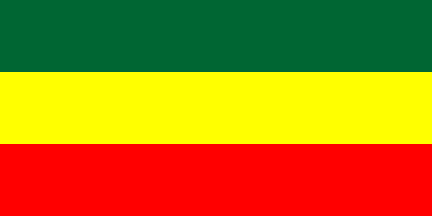! ….. ‘ህወሓት ለህዝብ ሮሮ ጀሮ የለውም’ …!
ህወሓቶች በ9ኛው የኢህኣዴግ ጉባኤ ተሸማቀው መመለሳቸው ተሰምተዋል። በሁሉም የኢህኣዴግ ኣባል ድርጅቶች ኣለመተማመንና እርስበርስ መናናቅ ቢስተዋልም ህወሓቶች የለመዱቱን ‘ክብር’ በመነፈጋቸው (የሚያቀርቡት ሓሳብ ሲብጠለጠል በማየታቸው) እጅግ እንዳዘኑና እንዳፈሩ ለማወቅ ተችለዋል።
ድሮም ቢሆን እነዚህ ተራ የህወሓት ኣባላት (የኣሁኑ መሪዎች ማለቴ ነው) ከሌሎች የድርጅት መሪዎች በቀጥታ (የሓሳብ) ክርክር ኣድርገው ኣያውቁም። በመለስ በኩል ነበር የሚገናኙ። መለስ ለየብቻቸው ያሳምናቸው ነበር። ኣሁን ይሄን ሚና የሚጫወት የለም። እናማ ህወሓቶች ተንቀናል (ተሰሚነት ኣጣን) ብለው ኣኮረፉ፣ ኣፈሩ። በትክክል ውርዴት ነው። ኣንድ ተሳታፊ ‘ ቢስቢስ እኮ አሎምና’ (ትግርኛ) ብለዋል።
እንደዉጤቱም ከጉባኤው መልስ በትግራይ በኣብዛኛው የክልል መንግስት መስርያቤት በስብሰባ ተጠምደዋል። ትናንት (ሓሙስ መጋቢት 19, 2005) የመንግስት ሰራተኞች ስራቸው ትተው ስብሰባ ዉለዋል። የመንግስት ስራ ትተው ለፓርቲ ስብሰባ መጥራት ተገቢ ኣልነበረም።
እነሱ ስልጣናቸውን የሚያራዝሙበት ስብሰባ (የህዝብ ጅንጀና) ሲያካሂዱ ህዝቡ (ተገልጋዩ) ግን የፍትሕ ግልጋሎት ኣጥቶ ሲሰቃይ ማየት ያሳዝናል።
የመኾኒ ነዋሪዎች መኖርያ ቤታቸው እንደሚፈርስ ተነግሯቸዋል። በቅርብ ግዜ ወደ 7 ሺ ቤቶች ይፈርሳሉ (ገጠሩ ጨምሮ መሆን ኣለበት እንጂ 7ሺ ቤቶች በመኾኒ ከተማ ይኖራል ብዬ ኣልገምትም)። በመጀመርያ ዙር 1500 ቤተሰብ ይፈናቀላል። ይቀጥላል።
እነዚህ ነዋሪዎች መኖርያ ቤታቸው ሲፈርስ ሌላ ኣማራጭ መጠልያ ስለሌላቸው መንግስት መፍትሔ እንዲያፈላልግላቸው ለወረዳው ኣስተዳዳሪዎች ኣቤት ብለው ነበር። መትፍሔ ኣላገኙም። ችግሩ ያስጨነቃቸው ነዋሪዎች ከ150-200 የሚሆኑ ተወካዮች መርጠው ወደ ክልል መንግስት ቢሮ (መፍትሔ ፍለጋ) ላኩ።
ህወሓቶች በ9ኛው የኢህኣዴግ ጉባኤ ተሸማቀው መመለሳቸው ተሰምተዋል። በሁሉም የኢህኣዴግ ኣባል ድርጅቶች ኣለመተማመንና እርስበርስ መናናቅ ቢስተዋልም ህወሓቶች የለመዱቱን ‘ክብር’ በመነፈጋቸው (የሚያቀርቡት ሓሳብ ሲብጠለጠል በማየታቸው) እጅግ እንዳዘኑና እንዳፈሩ ለማወቅ ተችለዋል።
ድሮም ቢሆን እነዚህ ተራ የህወሓት ኣባላት (የኣሁኑ መሪዎች ማለቴ ነው) ከሌሎች የድርጅት መሪዎች በቀጥታ (የሓሳብ) ክርክር ኣድርገው ኣያውቁም። በመለስ በኩል ነበር የሚገናኙ። መለስ ለየብቻቸው ያሳምናቸው ነበር። ኣሁን ይሄን ሚና የሚጫወት የለም። እናማ ህወሓቶች ተንቀናል (ተሰሚነት ኣጣን) ብለው ኣኮረፉ፣ ኣፈሩ። በትክክል ውርዴት ነው። ኣንድ ተሳታፊ ‘ ቢስቢስ እኮ አሎምና’ (ትግርኛ) ብለዋል።
እንደዉጤቱም ከጉባኤው መልስ በትግራይ በኣብዛኛው የክልል መንግስት መስርያቤት በስብሰባ ተጠምደዋል። ትናንት (ሓሙስ መጋቢት 19, 2005) የመንግስት ሰራተኞች ስራቸው ትተው ስብሰባ ዉለዋል። የመንግስት ስራ ትተው ለፓርቲ ስብሰባ መጥራት ተገቢ ኣልነበረም።
እነሱ ስልጣናቸውን የሚያራዝሙበት ስብሰባ (የህዝብ ጅንጀና) ሲያካሂዱ ህዝቡ (ተገልጋዩ) ግን የፍትሕ ግልጋሎት ኣጥቶ ሲሰቃይ ማየት ያሳዝናል።
የመኾኒ ነዋሪዎች መኖርያ ቤታቸው እንደሚፈርስ ተነግሯቸዋል። በቅርብ ግዜ ወደ 7 ሺ ቤቶች ይፈርሳሉ (ገጠሩ ጨምሮ መሆን ኣለበት እንጂ 7ሺ ቤቶች በመኾኒ ከተማ ይኖራል ብዬ ኣልገምትም)። በመጀመርያ ዙር 1500 ቤተሰብ ይፈናቀላል። ይቀጥላል።
እነዚህ ነዋሪዎች መኖርያ ቤታቸው ሲፈርስ ሌላ ኣማራጭ መጠልያ ስለሌላቸው መንግስት መፍትሔ እንዲያፈላልግላቸው ለወረዳው ኣስተዳዳሪዎች ኣቤት ብለው ነበር። መትፍሔ ኣላገኙም። ችግሩ ያስጨነቃቸው ነዋሪዎች ከ150-200 የሚሆኑ ተወካዮች መርጠው ወደ ክልል መንግስት ቢሮ (መፍትሔ ፍለጋ) ላኩ።




